Christopher J. Hardy
Deep learning-based reconstruction of highly accelerated 3D MRI
Mar 09, 2022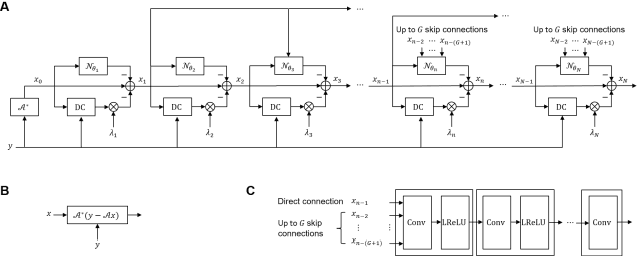



Abstract:Purpose: To accelerate brain 3D MRI scans by using a deep learning method for reconstructing images from highly-undersampled multi-coil k-space data Methods: DL-Speed, an unrolled optimization architecture with dense skip-layer connections, was trained on 3D T1-weighted brain scan data to reconstruct complex-valued images from highly-undersampled k-space data. The trained model was evaluated on 3D MPRAGE brain scan data retrospectively-undersampled with a 10-fold acceleration, compared to a conventional parallel imaging method with a 2-fold acceleration. Scores of SNR, artifacts, gray/white matter contrast, resolution/sharpness, deep gray-matter, cerebellar vermis, anterior commissure, and overall quality, on a 5-point Likert scale, were assessed by experienced radiologists. In addition, the trained model was tested on retrospectively-undersampled 3D T1-weighted LAVA (Liver Acquisition with Volume Acceleration) abdominal scan data, and prospectively-undersampled 3D MPRAGE and LAVA scans in three healthy volunteers and one, respectively. Results: The qualitative scores for DL-Speed with a 10-fold acceleration were higher than or equal to those for the parallel imaging with 2-fold acceleration. DL-Speed outperformed a compressed sensing method in quantitative metrics on retrospectively-undersampled LAVA data. DL-Speed was demonstrated to perform reasonably well on prospectively-undersampled scan data, realizing a 2-5 times reduction in scan time. Conclusion: DL-Speed was shown to accelerate 3D MPRAGE and LAVA with up to a net 10-fold acceleration, achieving 2-5 times faster scans compared to conventional parallel imaging and acceleration, while maintaining diagnostic image quality and real-time reconstruction. The brain scan data-trained DL-Speed also performed well when reconstructing abdominal LAVA scan data, demonstrating versatility of the network.
Adaptive Gradient Balancing for UndersampledMRI Reconstruction and Image-to-Image Translation
Apr 05, 2021
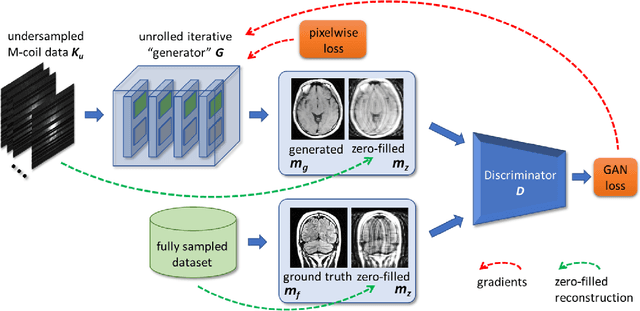

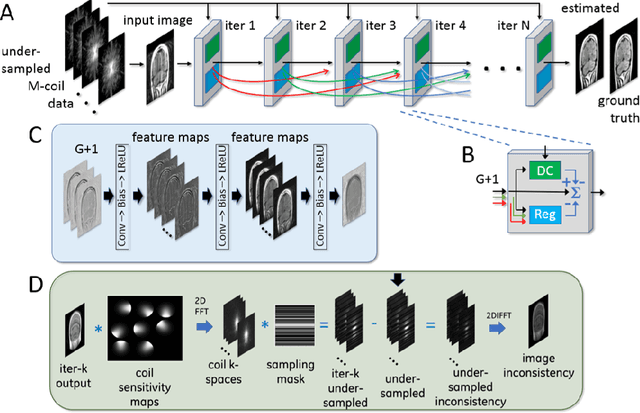
Abstract:Recent accelerated MRI reconstruction models have used Deep Neural Networks (DNNs) to reconstruct relatively high-quality images from highly undersampled k-space data, enabling much faster MRI scanning. However, these techniques sometimes struggle to reconstruct sharp images that preserve fine detail while maintaining a natural appearance. In this work, we enhance the image quality by using a Conditional Wasserstein Generative Adversarial Network combined with a novel Adaptive Gradient Balancing (AGB) technique that automates the process of combining the adversarial and pixel-wise terms and streamlines hyperparameter tuning. In addition, we introduce a Densely Connected Iterative Network, which is an undersampled MRI reconstruction network that utilizes dense connections. In MRI, our method minimizes artifacts, while maintaining a high-quality reconstruction that produces sharper images than other techniques. To demonstrate the general nature of our method, it is further evaluated on a battery of image-to-image translation experiments, demonstrating an ability to recover from sub-optimal weighting in multi-term adversarial training.
A Novel Approach for Correcting Multiple Discrete Rigid In-Plane Motions Artefacts in MRI Scans
Jun 29, 2020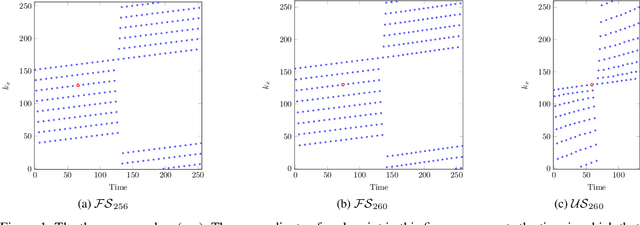


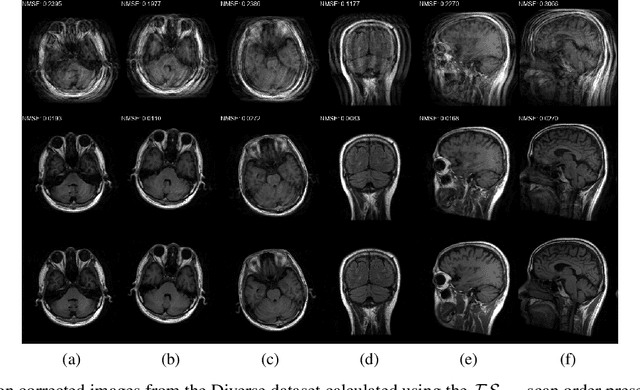
Abstract:Motion artefacts created by patient motion during an MRI scan occur frequently in practice, often rendering the scans clinically unusable and requiring a re-scan. While many methods have been employed to ameliorate the effects of patient motion, these often fall short in practice. In this paper we propose a novel method for removing motion artefacts using a deep neural network with two input branches that discriminates between patient poses using the motion's timing. The first branch receives a subset of the $k$-space data collected during a single patient pose, and the second branch receives the remaining part of the collected $k$-space data. The proposed method can be applied to artefacts generated by multiple movements of the patient. Furthermore, it can be used to correct motion for the case where $k$-space has been under-sampled, to shorten the scan time, as is common when using methods such as parallel imaging or compressed sensing. Experimental results on both simulated and real MRI data show the efficacy of our approach.
Conditional WGANs with Adaptive Gradient Balancing for Sparse MRI Reconstruction
May 02, 2019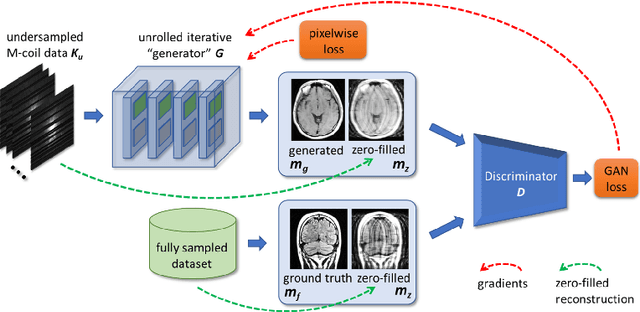

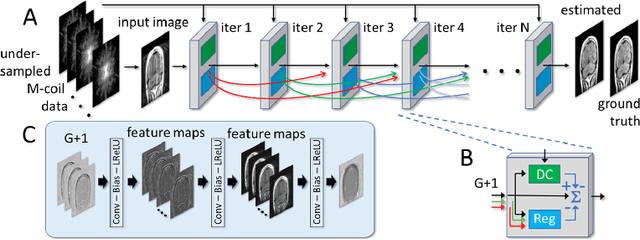
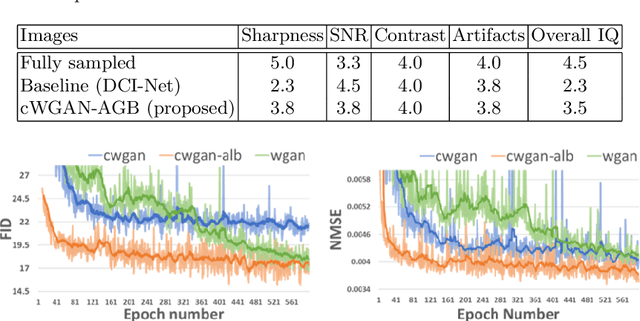
Abstract:Recent sparse MRI reconstruction models have used Deep Neural Networks (DNNs) to reconstruct relatively high-quality images from highly undersampled k-space data, enabling much faster MRI scanning. However, these techniques sometimes struggle to reconstruct sharp images that preserve fine detail while maintaining a natural appearance. In this work, we enhance the image quality by using a Conditional Wasserstein Generative Adversarial Network combined with a novel Adaptive Gradient Balancing technique that stabilizes the training and minimizes the degree of artifacts, while maintaining a high-quality reconstruction that produces sharper images than other techniques.
 Add to Chrome
Add to Chrome Add to Firefox
Add to Firefox Add to Edge
Add to Edge